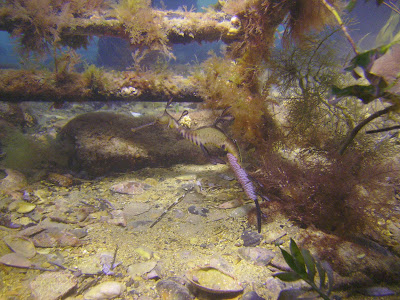Visit the
Australian Temperate Reef exhibit on the second floor and look closely. Do you
see them? They may not be breathing fire, but the Aquarium’s sea dragons are
just as awe-inspiring as their mythical counterparts! With their leafy
appendages and slow movements, they completely blend into their environment. And
those long snouts are perfect for catching small plankton as it drifts by.
Many
visitors comment the sea dragons resemble sea horses…and for good reason. They
are close cousins, part of the family of fishes called Syngnathidae. And
like their cousins, sea dragon males are responsible for most of the
reproductive responsibilities.
Male sea
dragons will take care of the eggs while they are incubating, just as male sea
horses do. However, instead of holding the eggs in an abdominal pouch, sea
dragons collect the eggs and keep them in a spongy brood patch near the base of
their tale. And with the female laying 250 to 300 eggs, that’s a lot of little
ones to worry about!
 |
| Photo of a weedy sea dragon with eggs taken by aquarist Jeremy Brodt while in Australia |
Once ready
to lay her eggs, the female will push the fertilized eggs into the soft skin of
the male tail. The skin becomes hardened, forming a cup around each egg that
secures it during incubation. After approximately six to eight weeks, the young
sea dragons hatch a few at a time and float away to start life on their own!
They do grow fast, reaching full size in approximately two years when they
could potentially have young of their own.
 |
| Look carefully-eggs on board this leafy sea dragon (Picture: J. Brodt, NEAq) |
Only a
handful of aquaria world-wide have been able to hatch sea dragons successfully,
as it is extremely difficult to do. And while we haven’t had any young here
yet, we do have great success showcasing our two species of sea dragons and
have our fingers crossed that we may have some young in the future. Since today is Appreciate
a Dragon Day…what better way to appreciate dragons than
to come to the Aquarium and get inspired with these amazing, but not so mythical,
creatures!
 |
| (Original:www.ourpeacefulplanet.com) |
— Jo



0 comments:
Post a Comment